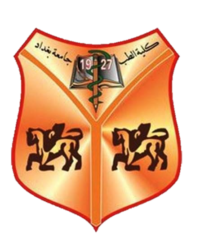Course Description
This course description provides a necessary summary of the most important characteristics of the course and the expected learning outcomes for the student to achieve evidence of whether he made the most of the available learning opportunities. It must be linked to a description the program.
General Description
| Category | Details |
|---|---|
| Name of Organization: | Baghdad College of Medicine |
| Department: | Medicine Department |
| Module Name: | Behavioral Science |
| Course Pattern: | Large group lectures, small group lessons |
| Semester and Year: | 4th Year / Semester 1 & 2 |
| Total Course Hours: | 6 practical hours + 20 hours Theoretical |
Goal of the Course
- This module deals with behavioral science as it forms the basis of the psychiatry module that is taught in the 5th grade.
- Understanding the thinking and behavior of a normal person, and thus giving greater ability for the skills of communication and behavior with patients in the future in their work.
- Knowing the theories of psychology is part of the medical culture that a graduate of the Faculty of Medicine is supposed to be familiar with at least.
Outcome of this Module
A. Cognitive and Theoretical Goals:
- Educating the students about thinking and behavior of a normal person.
- Educating the students about psychology theories.
- Preparing the students to study psychiatry in the next study year.
B. Skills:
- Communication skill with the patients.
- Understanding ethics and the relationship between the physician and the patient.
- Enabling the student to understand the thinking and behavior of a normal person.
Methods of Learning
- Large group lectures.
- Team-based learning.
- Small group sessions.
Methods of Assessment
- Written exams (single-choice questions).
C. Values and Sentimental Goals:
- Understanding the surrounding community.
- Part of general knowledge and cultural values.
Methods of Learning
- Large group lectures and workshops about communication skills.
Methods of Assessment
- Student activities and reports presented by the students.
D. General and Qualifying Skills (Other Skills Related to Employability and Personal Development):
- Communication skills learning.
- Learning and developing ethics.
- The acquired knowledge helps the student with future relations with the patients.
Infrastructure
| Category | Details |
|---|---|
| Course Books Required: | An Introduction to Behavioral Sciences, Dr. Maha Suleiman Younis 2010 |
| Main References (Sources): | Hilgard textbook for psychology, Kaplan & Sadok for Psychiatry and Behavioral Sciences |
| Recommended Resources: | APA Journal (psychology), Medscape Psychology |
| Electronic References: |
Course Development Plan
- Increasing teaching hours.
- Making students create seminars containing educational videos.

